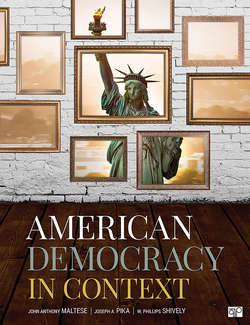Читать книгу American Democracy in Context - Joseph A. Pika - Страница 133
На сайте Литреса книга снята с продажи.
The First Amendment Freedoms of Speech, Press, and Assembly
ОглавлениеCould a democratic system survive without the free exchange of ideas? The ability to report on the actions of government, to express support for or opposition to governmental policies, to engage in meaningful debate, and to be knowledgeable enough about current issues to cast an informed vote would seem to be central to the existence of democracy. All of these things presuppose freedom of speech and of the press. Americans rightly count these as some of their most precious freedoms. But how much freedom does the First Amendment really allow? How much should it?
The phrase “Congress shall make no law” sounds categorical, yet Congress has passed quite a few laws that restrict freedom of speech and of the press in one way or another, and the Court has upheld many of them. Indeed, the Supreme Court has consistently ruled that neither freedom of speech nor of the press is absolute. Nonetheless, the protection of free speech and the press is greater in the United States than most other liberal democracies. Hate speech, for example, is banned in Germany (where it is a crime to deny the Holocaust) and some other European nations (as well as Canada) but is protected in the United States under the first amendment.
